Hand Washing
Why is hand washing important?
Your skin constantly makes oil that stays on its surface. The germs that get on your skin get trapped in the oil. Skin does not have to look dirty to be loaded with tiny germs that can cause big problems - like the common cold, diarrhea, and more serious diseases. Washing your hands with soap and warm running water is one of the best things you can do to stay healthy.
But I wash my hands a lot.
We are all usually in a hurry - to eat, to get back to work, to make that important meeting or class. Too often we forget of "don't have time." Or, we think a quick cold water rinse will do, but that doesn't "cut it"…literally.
Oils, and any attached germs, must be removed from the skin. A splash of cold water and a quick rub with a towel doesn't do much good. You need to use warm or hot water and soap to get the oil and germs off your skin.
If I wear rubber gloves, do I need to wash my hands as often?
Gloves are helpful in preventing the spread of disease, but hands should still be washed before gloves are put on, when changing to a new pair of gloves and after taking the gloves off.
Should I use antibacterial soap?
The most important thing to remember is to wash with warm running water and soap. If you want to use antibacterial soap, keep in mind that antibacterial soap helps kill some germs - but not all. Some germs can't be killed, no matter how strong the soap is or how long you leave it on. Besides, you might not always have special soap with you. That's why it's very important to spend enough time and care to wash germs away.
To do the most good, washing your hands has to become a habit. You're more likely to learn a new habit and stick with it if it's easy. Most of the time, proper hand washing is easy.
Can I just use a waterless hand sanitizer lotion or gel with alcohol in it?
Washing your hands with soap and warm running water remains the best way to rid your hands of germs. However, if soap and clean water are not available using an alcohol-based product to clean your hands is the second best choice.
Look for alcohol-based hand rubs that contain 60% alcohol or more. These will be more effective in reducing the number of germs on the skin.
Waterless sanitizers work by killing germs on the hands not by actually removing the germ as in hand washing. It is important to remember that sanitizers will not kill all harmful germs on the hands and are not effective for cleaning hands that are visibly dirtied.
When should I wash my hands?
Before you:
- Eat
- Prepare food(s) for self or others
- Treat a break or cut in the skin
- Care for an ill/injured person or animal
- Insert or remove contact lenses
Immediately after you:
- Use the restroom
- Handle uncooked foods (especially raw meat, poultry, or fish)
- Change a diaper
- Blow your nose, sneeze, or cough
- Touch an animal (especially a reptile)
- Handle garbage
- Care for an ill/injured person or animal
Whenever you've been touching things many people have handled. Routine hand washing can help reduce your chances of getting an infection.
How you wash and dry your hands makes a difference.
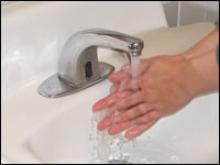
1. Rinse hands with warm or hot running water.
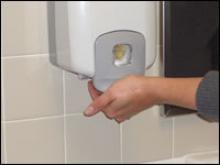
2. Apply Soap.
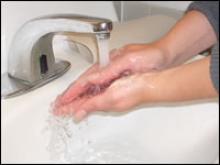
3. Lather up the soap and start washing.
Take at least 15-20 seconds (sing the “happy birthday” song twice) to wash all surfaces using a vigorous rubbing friction), including; wrists, palms, backs of hands, between finders, and as much as possible under finger nails.
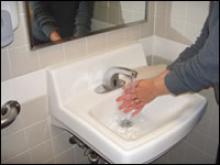
4. Rinse the germs away.
Manually scrubbing loosens germs and rinsing hands under warm running water washes them away.
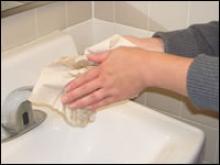
5. Dry your hands.
Away from home, dry using disposable paper towels or the hot air blower if possible. At home, provide a separate towel for each member of the household, and wash towels regularly in hot water and detergent.
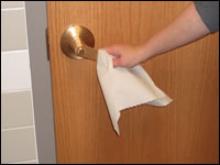
6. You’re done!
If possible use the paper towel to turn off the faucet and open the door to leave.

